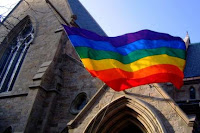 A common theme in Word Alone and other anti-inclusivity blogs, web sites, sermons and documents is that by making a denomination more inclusive and welcoming to LGBT people, the denomination experiences a decline in membership. They frequently point to surveys that show a decline in church attendance and membership over the past 20 years. I think this is a case of justifying a position by interpreting a trend to one’s advantage.
A common theme in Word Alone and other anti-inclusivity blogs, web sites, sermons and documents is that by making a denomination more inclusive and welcoming to LGBT people, the denomination experiences a decline in membership. They frequently point to surveys that show a decline in church attendance and membership over the past 20 years. I think this is a case of justifying a position by interpreting a trend to one’s advantage.
You can find numerous reliable surveys on the net concerning church attendance. In this past decade, the percent of Americans regularly attending church steadily hovers around 40%. These surveys also reveal that most mainline Christian denominations are declining in membership and attendance, but not by significant numbers. The reality is quite a bit different than what some people report. Hordes of Christians are not fleeing their churches in a panic.
So where are they going? It’s safe to say that many Lutheran churches see less people in the pews than they did 10 years ago. I believe there is a cultural shift taking place in regards to religion. In the past we grew up in a faith and remained in the faith until we died or married a person from another faith. Once a Lutheran, always a Lutheran. The mega non-denominational churches changed the landscape. They developed worship, programs and outreach to meet both the spiritual and material needs of families. Many mainline denominational churches were unable to make this shift and adapt their ministries.
Some of my friends have joined these churches to take part in the family and youth programs and activities. The fact that it was not their faith of birth had no relevance. At the same time, I would note that Lutheran and other mainline congregations that embraced this change have grown and bucked the declining membership trend.
What effect does a welcoming Church have on this trend? The recent 2007 Welcoming Church Survey by www.gaychurch.org revealed that the number churches who visibly identify themselves as welcoming to LGBT Christians increased 400% over the past 17 years. In other words, there has been a dramatic increase in the number of churches who seek to identify themselves as inclusive congregations. I can tell you from friends who belong to an inclusive congregation that attendance remained stable after they adopted a welcoming statement. Sure, some people chose to leave, but new people also chose to join. This should not be a surprise since churches aligning themselves with programs such as Lutherans Concerned’s Reconciling in Christ program tend to be very LGBT friendly and have a more liberal take on inclusivity and tolerance. The adoption of the policy was only a formality.
Ask yourself this simple question, “Does what happens in a neighboring church in your denomination really affect your attendance and support of your church?” It makes no difference to me and most people. By nature churches are congregational. We form these faith based families based on our common beliefs, culture and background. If the neighboring church were to call a LGBT pastor, neighboring churches would feel no consequences. The same would apply if that church were to hold a commitment ceremony for a same gender couple.
The bottom line is that Americans now demand more from their Church than our parents did 20 years ago. They are not complacent to just belong to their father’s church. They want a church that enhances their lives in ways beyond the spiritual side. They look for churches that sponsor day trips, sports leagues, health clubs, singles nights and special interest clubs. Time is precious for the modern family. They look for that one-stop-shop where they can worship, play and grow in a convenient, friendly atmosphere. Most mainline churches fall short in meeting these needs and their attendance shows the results.
The inclusion of LGBT people is a very minor factor in the shift of people from one denomination to another. Actually, the exclusion of LGBT people is probably more of a factor for LGBT people leaving a denomination. My belief is that denominations and faith exist across the full spectrum of Christianity. The reason they exist is to bring the good news to diverse communities in ways and in a style that best suit these communities. This is how we make disciples and spread the good Word. If we allow congregations who desire to be LGBT inclusive to be inclusive, the Lutheran faith will grow. If we fail to allow this inclusivity, they will not grow. It’s that simple.
